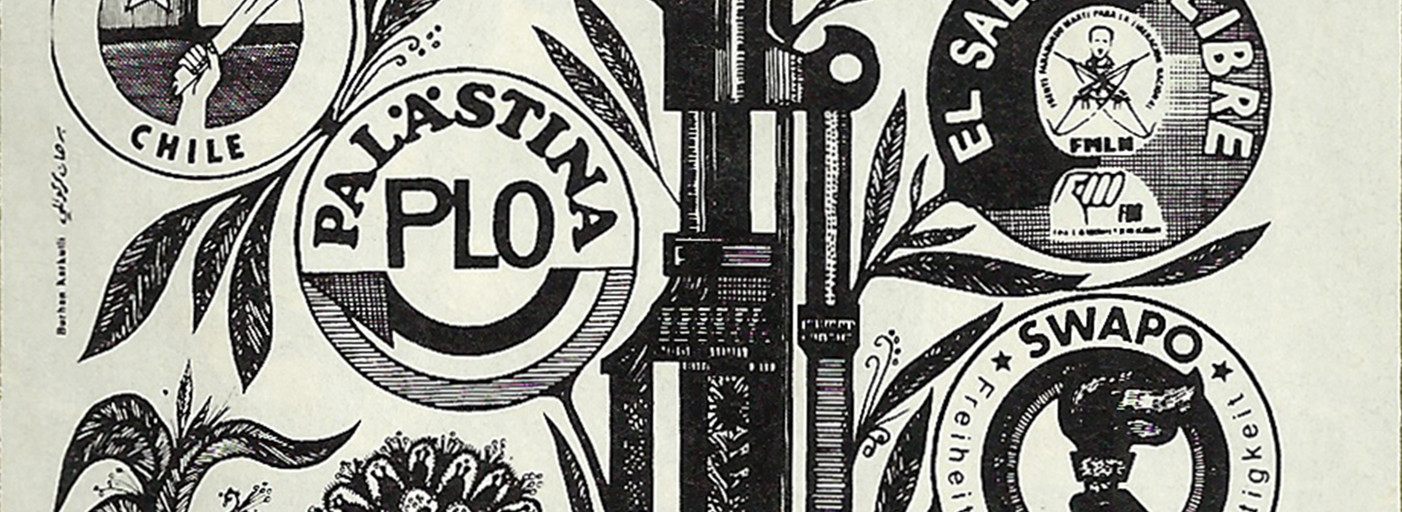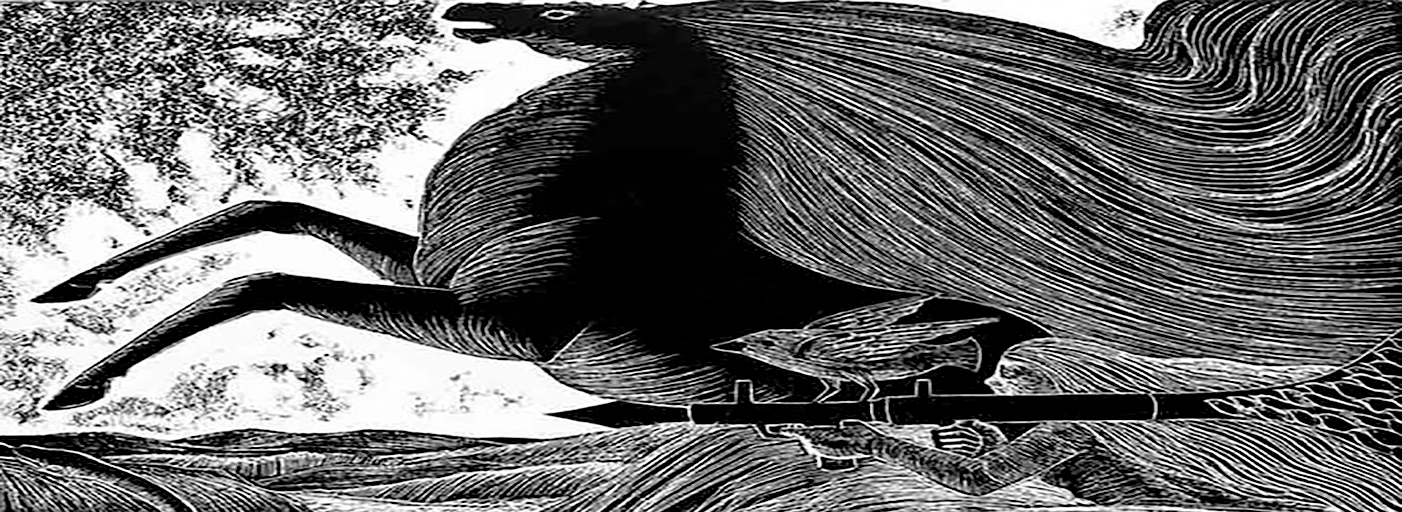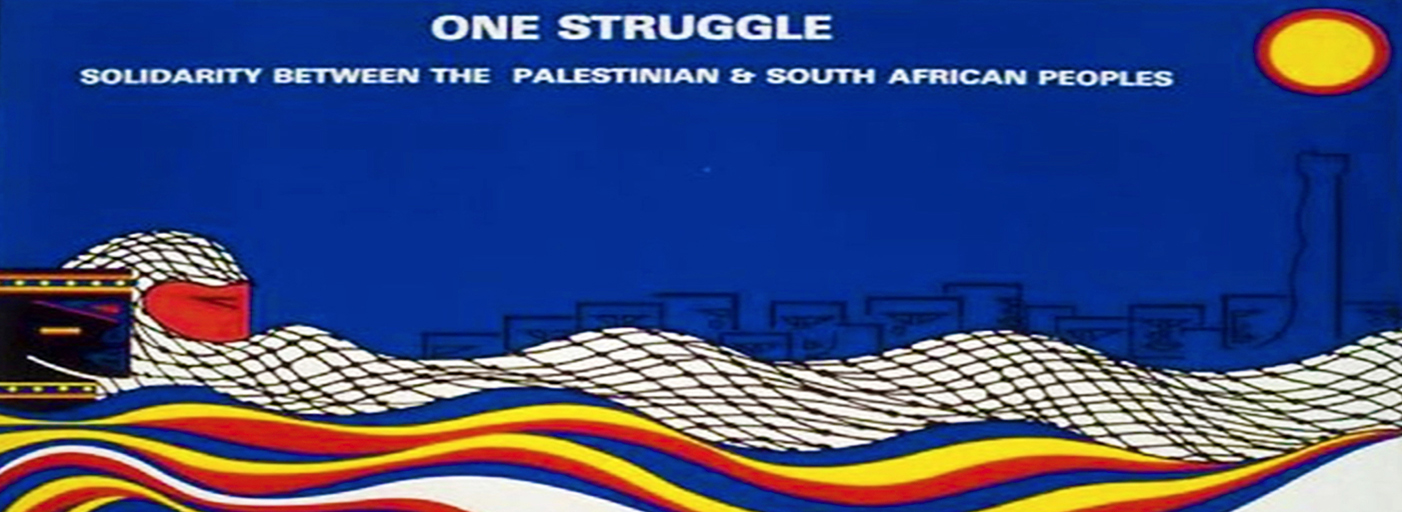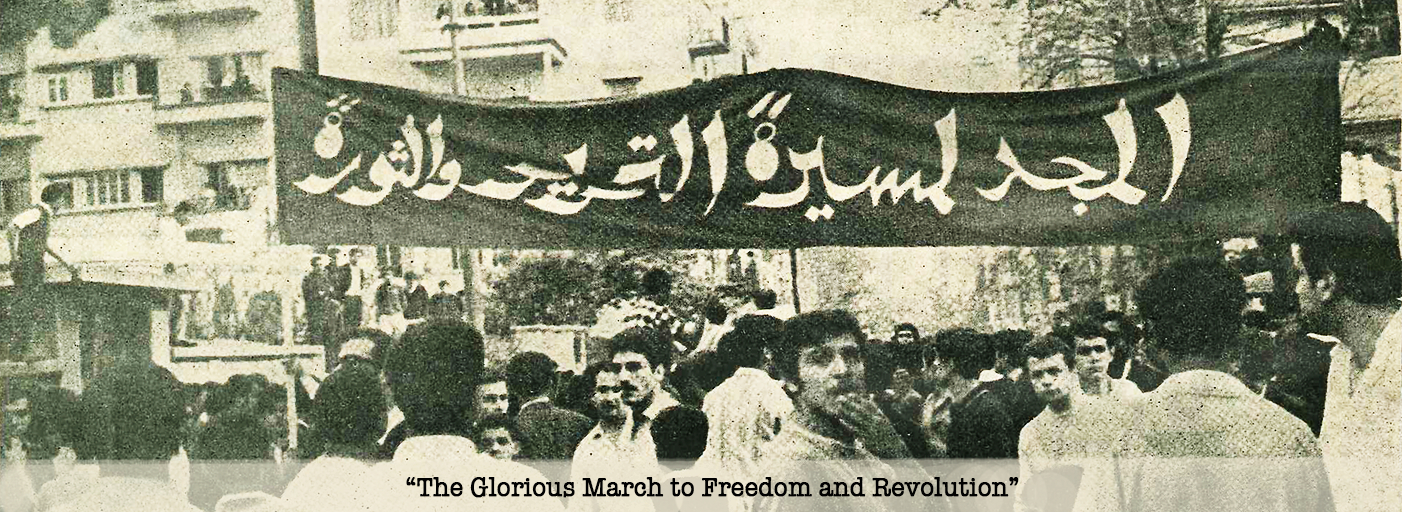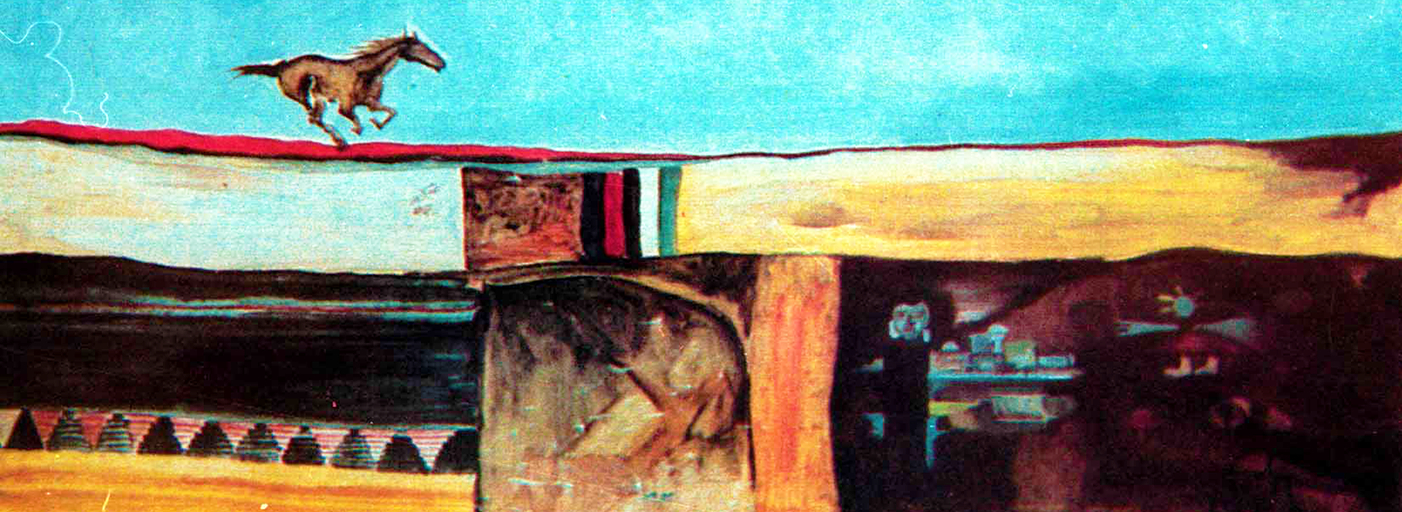The Palestinian Revolution is a bilingual Arabic/English online learning resource that explores Palestinian revolutionary practice and thought from the Nakba of 1948, to the siege of Beirut in 1982. These thirty four years of Palestinian political and social history were characterised by a distinctive revolutionary culture, that was expressed in specific political practices and forms of thought. The era also witnessed the mobilisation of hundreds of thousands of Palestinians, Arabs, and international volunteers outside and inside historic Palestine.
These revolutionary cadres built dynamic popular movements and created national representative structures with substantial political, military, and cultural capacities, launching a classic armed liberation struggle that counts as a landmark anti-colonial movement of the twentieth century. Alongside its fraternal older Algerian movement, the Palestinian revolution was to Arab world and the broader Middle East what the Vietnamese revolution was to Southeast Asia, the South African to Africa, and the Cuban to Latin America. It had strong fraternal connections to these and other revolutions, cooperated intimately with them on several levels, and shared both outlook and language of anti-colonial and anti-imperial liberation struggles of Africa, Asia, and Latin America.
Beyond this regional stature, the Palestinian revolution took on huge global significance, drawing on energies and resources from across the world, while influencing politics, thought, and culture throughout it. The website introduces readers to this remarkable phenomenon entirely through primary and contemporary sources. This digital resource is not an archive, an encyclopaedia, or a gazetteer, so is not aimed at a collection of all documents or a chronicle of the many seminal events relating to the Palestinian revolution. It is an introductory reader and visual platform that illustrates some of the Palestinian revolution’s major themes, and provides a twelve week curriculum that introduces some of the debates, the discussions and some events of this era through the eyes of the protagonists who contributed to it.
The intellectual framework for the website was developed following three years of workshops and discussions carried out by leading Palestinian historians, librarians, and movement and party archivists in Oxford, Beirut, and Nablus. We were supported by generous knowledge-sharing on the part of two key projects: the Museum of the Cuban Revolution in Havana, and in particular the South Africa Democracy and Education Trust (SADET), who were just finishing their multi-volume collective work on the history of the South African struggle. The work also benefited immensely from the enthusiastic cooperation and involvement of a plethora of Palestinian institutions: An-Najah National University, Bir Zeit University, the Abu Jihad Museum of the Prisoners Movement, the Sakher Habash Centre, the Institute for Palestine Studies, PASSIA, the Palestine National Council, Shuun Filastiniya, and WAFA. Along with all the major Palestinian political parties, these institutions opened their doors, collections, and address books for us to draw on. Likewise, dozens of cadres welcomed us to their homes, sharing their life experiences for all those interested in the history of anti-colonial liberation movements. A substantial collection of sources was gathered through this endeavour, and we have selected a number of these for the purposes of the site. They are organised in two sections: ‘Teach the Revolution’ and ‘Learn the Revolution’.
Teach the Revolution
‘Teach the Revolution’ is an online course organised around twelve thematically arranged weeks. It can be used by lecturers and students at the advanced undergraduate or graduate university levels, by researchers as an online anthology, and by general readers as a tool for self-guided learning. Each topic can be studied using primary sources and writings from the period, selected to provide diverse written and oral history coverage, and featuring memoirs, interviews, communiqués, resolutions, declarations, photographs, videos, songs, posters, and excerpts from revolutionary publications. The site also has a broad geographic scope, including material that covered the various areas of historic Palestine as well as Palestinian refugee communities in the Arab countries and beyond. It gives experiences from a wide range of movements, fronts, organisations, unions, tiers of leadership, and gender, social, and class locations. The themes are contextualised regionally and internationally within broader Arab and global dynamics, including the role of thousands of revolutionaries who joined the Palestinian struggle from across the world.
The pedagogical approach is centred on an historical education driven by primary sources. It rests on the belief that access to the voices of the past is essential for developing a keener awareness and heightened sense for the frameworks, practices, and tangible experiences of the Palestinian revolution, especially of the revolutionaries themselves. Drawing on methodological advances in the study of political traditions, Palestinian historical texts are approached here as engagements with, and reflections of, certain revolutionary practices that prevail in particular eras. Exploring these practices, the materials included are preceded by introductory essays that place sources in their historical contexts. These were written to assist readers in navigating the politics, social dynamics, and culture of the revolutionary era, while guiding them through some of the complex terrain of Palestinian revolutionary history between 1948 and 1982. Although they do cover some key turning points, events, and dates, they also focus on the ‘moments in between’ which are often overshadowed by the usual historical milestones. It is hoped this material will afford students the ability to view the Palestinian revolution from the diverse disciplinary and methodological angles of social, cultural, and diplomatic history; historical biography; as well as sociology, politics, and international relations.
Upon completion of the course, students will achieve some familiarity with the major structures, movements, and organisations of the Palestinian revolution; encounter individual figures from multiple layers of leadership and grassroots organising; gain awareness of the structural dilemmas and possibilities that affected the Palestinian revolution; cultivate an appreciation of the social, gender, and labour struggles unfolding within the revolution; acquire a sense of the major political and cultural texts from the revolutionary period; and develop a visual awareness of the iconography of the revolution.
Learn the Revolution
A different browsing and learning experience is offered by the second section of this website, ‘Learn the Revolution’. This is an online gallery that allows viewers to explore three subjects: revolutionary movements, revolutionary moments, and revolutionary culture. These subjects retrieve some core aspects of the Palestinian revolutionary life, presenting them through the voices of the cadres of the Palestinian revolution. Dozens of oral testimonies filmed in Palestine, Egypt, Jordan, Lebanon, Syria, and the United Kingdom were gathered specifically for this site. Wherever relevant these testimonies are supplemented by other visual and textual material. This allows users of this site to explore the themes in a semi-structured manner.
Revolutionary Movements gives a glimpse of the ways Palestinian cadres founded and joined movements, trained in them, and mobilised and planned for action through them. It introduces users to experiences in major movements and parties; to the Palestine Liberation Organisation as the main national structure; as well as the popular unions and organisations, such as the General Union of Palestinian Women, which acted as the core site of revolutionary civic mobilisation.
Revolutionary Moments is a foyer into how Palestinian movements carried out their engagements within historic Palestine and along its Jordanian, Lebanese, and Syrian borders; and how they practiced global solidarity, and were supported by movements and individuals across the world. This section gives an introductory journey into the world of intensive Arab involvement in the Palestinian struggle; the richness of its African, Asian, and Latin American connections; and profound levels of solidarity in the midst of the challenging political atmosphere of Western Europe and North America.
This section features a few of the seminal episodes in Palestinian history, such as the launch of armed struggle in the mid-1960s, the battle of Karameh in Jordan, the liberation of the camps in Lebanon, Land Day inside Palestine, and the siege of Beirut. Rather than a comprehensive or complete study of these moments, or an account that privilegese those chosen over many others, this section provides awareness on how ordinary cadres, in different geographic locales, dealt with some of the most critical junctures in their history.
The Revolutionary Culture section brings viewers into the world of Palestinian revolutionary ideas, intellectual output, and creative production in the printed press; cinema, radio, and photography. It further explores the phenomenon of revolutionary education and the many forms it took. The aim here is to give a sense of the breadth of the front on which Palestinian cultural struggle was conducted, and to allow users to explore different types of cultural experiences from the period.
Through these sections and sub-sections, we hope users of this site can begin to hear the distinct voices of Palestinian cadres from different movements, factions and levels of political responsibility, see their faces, and touch their experiences, both individual and collective. Each section also features some selected posters, videos, photographs, and songs from the era to enhance an audio-visual sense of the themes at hand.
Cadres
As a companion to these sections, we have also created a Cadres page which has a Youtube channel connected to the site, that includes a large number of interviews conducted with cadres of the Palestinian revolution (filmed from 2009 onwards), in Palestine, Lebanon, Jordan, Syria, and Egypt. A diverse range of interview excerpts have also been subtitled into English, with the complete translations to be finished in due course. This platform will be updated periodically, as more are subtitled into English, and new interviews gradually added. As one of the largest online oral history collection available on an anti-colonial struggle, this rich resource will be of great benefit to researchers, scholars, and the general public alike. Due to their density and thematic coverage, these intimate discussions of political engagement can be used as resources by political theorists, scholars of revolution, as well as students of anti-colonialism, republicanism, tricontinentalism, national liberation movements, labour, race, gender, Middle East studies, and other fields.
Sponsors and Affiliated Institutions
This collective endeavour was the direct outcome of a British Academy sponsored programme that was initiated and directed by Dr Karma Nabulsi (St Edmund Hall, Department of Politics and International Relations, Oxford University), and is hosted by the Department of Politics and International Relations (DPIR), Oxford University. The site is co-authored, curated, and edited by Professor Nabulsi and Professor Abdel Razzaq Takriti, Arab-American Educational Foundation Chair in Modern Arab History at the University of Houston. It has received welcome support in subsequent years from a range of contributors, including The Oxford Palestine Archive Foundation, Abdel Mohsen Qattan, Dr Nabil Qaddumi, Hani Kalouti, Samir Ghalib Younis, Rana Sadik, and Sawsan Asfari. The programme has enjoyed the support of a wide range of institutions, including the South Africa Democracy Education Trust, the Museum of the History of the Cuban Revolution, and is now affiliated with a number of institutions and universities worldwide, that are concerned with research and teaching in this area: the Centre for Palestine Studies at SOAS (University of London), the European Centre for Palestine Studies at Exeter University, Bir Zeit University, An-Najah University, the Abu Jihad Centre at Al-Quds University all in Palestine, the Arab-American Educational Foundation Chair at the University of Houston, the Institute of Palestine Studies Library in Beirut, the Historical Institute at Havana, the Centre for Education and Transformation (CERT) at the Faculty of Education of the University of Johannesburg.
Learn Palestine and The Palestinian Revolution, is licenced under Creative Commons Attribution Non-Commercial No Derivatives. All material on the website must be attributed to the author(s) or original copyright holder. Website content cannot be used for commercial purposes under any circumstances. Derivative works cannot be created without permission.
Attribution Guide
Please use the following formats to cite material:
The website
To cite the contents of Learn and Teach Sections, and any part of the website, or the website as a whole, please use the following format:
Nabulsi, K., and Takriti., A.R., The Palestinian Revolution, 2016. https://learnpalestine.qeh.ox.ac.uk (and the date accessed).
Teaching week essays and background pages:
To cite essays and webpage content, please use the following format:
Nabulsi, K., and Takriti, A.R., “Revolution in the World,” The Palestinian Revolution, https://learnpalestine.qeh.ox.ac.uk (and the date accessed).
Translated book excerpts and articles:
To cite translated book excerpts and articles, please use the following format:
al-Khuffash, H. S., Memoirs of Husni Saleh Al-Khuffash: On the History of the Palestinian Arab Labour Movement (Beirut, 1973), translated by The Palestinian Revolution, 2016. https://learnpalestine.qeh.ox.ac.uk (and the date accessed).
Oral History interviews and transcripts:
To cite oral history interviews and transcripts, please use the following format:
Saudi, Mona, interviewed, in Nabulsi, K, and Takriti, A.R, eds., The Palestinian Revolution, 2016.
https://learnpalestine.qeh.ox.ac.uk (and the date accessed)
Scholarly articles in original language (untranslated):
Author, Title, Publisher. Available through The Palestinian Revolution, 2016. https://learnpalestine.qeh.ox.ac.uk (and the date accessed)
Book excerpts in original language (untranslated):
Author, Title, Publisher. Available through The Palestinian Revolution, 2016. https://learnpalestine.qeh.ox.ac.uk (and the date accessed).


